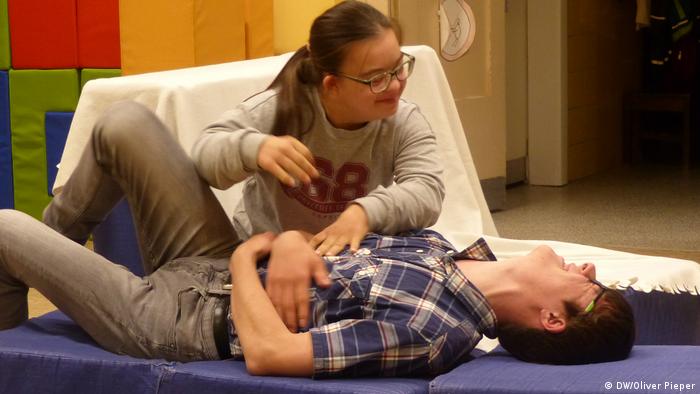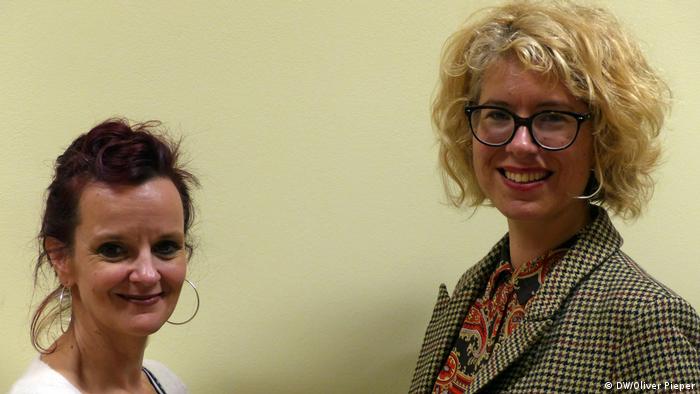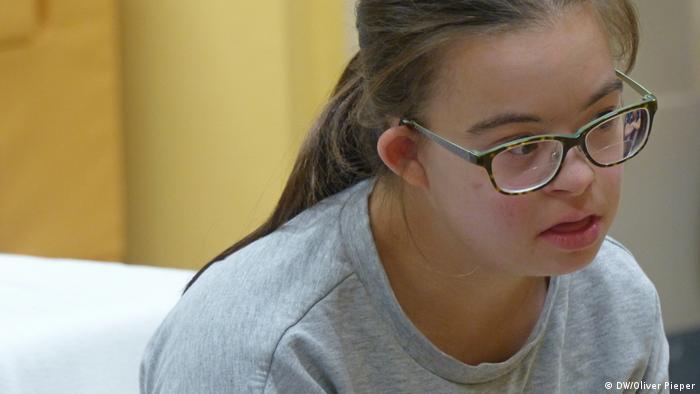In Bonn, the samples for the tragedy by William Shakespeare, running at full speed. The special feature of the theatre: the performers of The world famous our lovers both have down’s syndrome.

Julia would not want to live any more. With a trembling voice, the petite woman, holding out the black dagger at her neck and screaming her anger and despair again and again. “I want to die,” roars you are passionate. Romeo looks at his love with a mixture of admiration and Pride.
Romeo and Juliet hot in real life, Hendrik and Antonia, are 20 and 18 years old. For Hendrik, it is already the fourth piece of theatre, for Antonia the second. Both have trisomy 21. And play with an enthusiasm that spills over to the entire lay-Ensemble with and without disabilities.
The Ensemble must deliver, whether with or without down syndrome
The Director is always energetic in between, the performers tips and calls your main character to focus on. “We are working very hard on the Premiere, in front of 400 people. And the need to run, we have to deliver,” says Katharina Weishaupt. You mean, For Hendrik and Antonia, the same drama will apply requirements at the same time as for the Rest of the ensemble without down syndrome.
Weishaupt has specialized in inclusive theatre and in the past five years, the “frog king”, the “Midsummer night’s dream” and “Undine” on the boards brought. Your approach: you want people with disabilities to get the most out of your role in society. “They are often passive, you get help. If disabled people play theatre, make something, give something, for which people pay money,” says Weishaupt.
Be flexible and improvise
The Director has also taken itself very much from their performer, and has learned to be flexible, to focus ideas from the Desk, she says: “If something doesn’t work out, because the Moment or the mood is different, it works in a different way.”

Monika Frohn of the Lebenshilfe Bonn (li.) with Director Katharina Weishaupt
This also means that inclusive theatre requires a lot more text to work. Complex texts are broken down to everyday life. From a difficult set of three will light. Improvisation is asked. The performances, if the audience calls in between, and the cast quick as a flash, need to act on it. “There are many absurd situations and a lot of anarchy,” says the Director: “We laugh together a lot.”
Discrimination is still part of everyday life
Also Marion Frohn breaks in the samples, often in Laughter. She coordinates the theatre and works as a volunteer at the live aid in Bonn. As a parent initiative launched, supported the club for 60 years, people with intellectual disabilities from early Childhood to old age.
Today, the care in residential groups include, in addition to inclusive theatre or day care to dance classes, or even the Translation of texts in easy and simple language. “People with disabilities are also discriminated against today, Antonia and Hendrik always have to hear many mean things,” complains Frohn: “But it has done socially in the last few decades a lot.”
A little progress in each other
The children with intellectual disabilities were formerly in the nursery still, and play together in there today, children with and without disabilities. For the past ten years, there is inclusion at German schools. People with intellectual disabilities are no longer hidden as it used to.

Actress Antonia is at the end of October, as Juliet, at the Bonn theatre stage
Germany has developed, but still there is too few points of contact, such as, for example, she leads a dance group, explains Marion Frohn: “I’m taken to another world, I must change me, and a different perspective gains. Anyone who is immersed as a non-disabled in this world, is to immediately fire and flame, because people with impairments are so pure.”
Discussion about the down syndrome blood test in pregnancy
In the past few weeks, there were an estimated 50,000 people with down syndrome in Germany, suddenly very present. We discussed passionately about it, whether the blood tests are to be taken to trisomy of the health insurance or not.
The Federal Joint Committee of Physicians, statutory funds and clinics decided, finally, that the funds are expected to pay from the fall of 2020 the Test for at-risk Pregnant women under a narrow set of conditions.
“I’m very angry, because it sounds a little afterwards, that you want to control,” criticises Frohn, “just because I circle with down syndrome have very many people in my known and it is unimaginable for me is that there are these people.” But it was at the same time extremely difficult, in the Situation of a mother-to empathize, to have a child with a disability. “I’m torn,” says Monika Frohn.
Hendrik and Antonia have big plans
The rehearsal for “Romeo and Juliet” has just break. Hendrik takes his Antonia protective in the Arm. The main characters of the piece are also private for two years, a Couple of. So unhappy as is the case with Shakespeare, your love not to end, the two are already planning eagerly for their common future.
“We live at our parents, but eventually we want to pull together, of course,” said Hendrik, “but now it is only once the performance. And that is very exciting!”